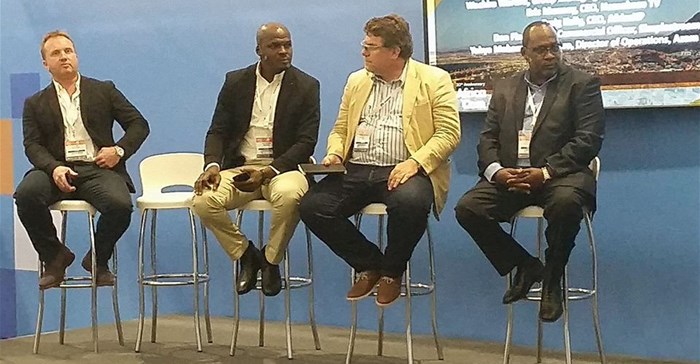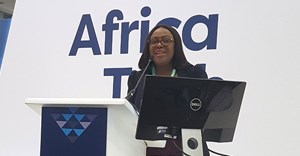#AfricaCom: Africa's audiences want African content

Panels on the monetisation of content platforms across Africa dominated the conversation, with broadcasters from Nigeria, Kenya, Uganda, Ethiopia, South Africa and Europe weighing in. Content creators also want an opportunity to ship local African content across the world; and make that local African content available and push it on the continent to audiences, not just bring in the content from elsewhere in the world and repackage and dub it for African audiences.
Participating in the panel on Understanding Content Consumption Patterns to Grow Revenues, Wachira Waruru, the group managing director of Royal Media Services, Kenya, said we have only scratched the surface of local content in Africa.
“The problem with the current model is the insistence in continuing to feed Africa with global content. We need to invest in local content in Africa. But because the Hollywood model is so successful elsewhere, broadcasters are not willing to invest in other content models.
“Television is a deep pocket business and western investors have dismissed African content,” he said.
Local content
Eric Monney, CEO, Homebase TV, is active in the Ethiopian market. He advises getting into a market with appropriate content that can be dubbed into indigenous languages, and once there is a return on investment (it took them four years in the market to turn a profit), to invest in original content to grow free-to-air services. “We can’t do Game of Thrones, but we are looking at developing local talk shows and so on.”
It is absolutely all about content patterns and getting it right, said Yahya Mohammed Kimaro, director of operations, Azam Media, Tanzania and East Africa. “When we started we had to analyse several models which would allow us to do it: Static Content; Social Content; Conversational Content. We looked at the potential in the market.
“We decided to make local football a premium. We haven’t looked back. We are the pioneer of local sporting content in East Africa. Football is the conversation we have and it is looking better for the business. Our secret was that we managed to localise content. Now we are looking at how to modernise and improve our content.”
The African broadcasting industry is complicated, warned Craig Kelly, CEO, AfricaXP content distributors. “The size of the whole continent, the different languages, the fragmentation of the market and the increasing demand for local content in indigenous languages in a market that doesn’t have a very big advertising spend, is a challenge.”
Kelly recounted how many pay-TV platforms had failed in the last 20 years because their costs were too high relative to their ability to generate revenue, not content.
#Internet will become main delivery mechanism for #TV in the future, says @DanFinch1 @Simplestreamuk #AfricaCom pic.twitter.com/PGiNb7pZhS
— Louise Marsland (@Louise_Marsland) November 9, 2017
Dan Finch, chief commercial officer, Simplestream live streaming TV, advocated a “skinny bundles” content model, saying audiences only wanted to pay for what they wanted to watch nowadays. “I think it is better for customer service because they get what they want. People are happy to pay for a basic pay-TV subscription.”
Waruru agreed: “We are a supermarket of content. We have daily subscriptions, weekly subscriptions for a dollar and monthly subscriptions for three dollars.” Content that was important and needed, he said, was content that dealt with education and welfare.
Kelly pointed out that changes in technology had allowed more niche channels at a lower cost, which would aid growth in content distribution in Africa. “The way technology has developed now, we put our content into the cloud, we build a playlist and push it to a set top box and that allows us to customise content. That kind of customisation is easier, less costly, requires less staff. The viewer is only using the bandwidth of the channel they are watching at any given time.
“Obviously content production needs to be creative, the cost of content production still exists. But essentially, monetising content becomes a question of aggregating multiple low value payments,” said Kelly.
As content consumption panel moderator, George Twumasi, CEO, African Broadcast Network (ABN), Southern Africa, concluded: “The African content broadcast market has nowhere peaked and there are billions of dollars to be earned.”
Content models
There is a lot of interest in combining content distribution models for video consumption on the continent, said Cees van Versendaal, executive sales manager, Mware Solutions, IPTV solutions. He was speaking on a user experience panel on Developing a Content Monetisation Platform for Different Regions in Africa.
“There is an appetite for good content and good experience and the means to pay for it. But to attract advertising you need subscribers. In the end it is more about what are the funds available to enter the market.
“We try to create as many templates as possible, so everyone has a choice. We try create the same experience on any device, from smart TV to tablet. If the experience is the same, then you will see more mobile devices being used.”
Data of course remains a massive stumbling block in Africa and panellists accused mobile networks of wanting to retain all the profits from data consumption, when they were getting all the content for free from broadcasters across Africa – leading to the high data consumption patterns across mobile devices.
“There is a lot of talk about free Wi-Fi… data being a human right,” said Pierre van der Hoven, founder and CEO, Tuluntulu, the mobile TV app. “If people are consuming data, then the mobile networks are keeping 100 percent of that data revenue. We’ve had endless conversations about the fact that we are bringing in the content for free, so why don’t they bring in the data for free. Watching television on a mobile device is accessible. We need to move people up the value chain and start having these discussions.”
The consensus opinion is that the mobile networks are holding back the ability for African broadcast networks to show a profit on the continent and grow subscribers and limiting the access to content that African consumers have access to. It is probably the biggest stumbling block to profitability and accessibility of African content – which is not just all entertainment and sports, but aspirational, educational and informative.
Another speaker on the afternoon of day two, Charles Dawes, senior director, international marketing at Tivo, put it succinctly: “Data is the future of the monetisation of content.”
Content piracy was another issue dealt with by the content monetisation panel. Ryan Solovei, CEO of Kwese Play, a content distribution company and also providers of the biggest fibre network across Africa, added: “When Netflix launched, piracy disappeared overnight. Customers can still get a lot of genuine entertainment with a data fix. There is still a lot of piracy in sports broadcasting.”
Steeve Huin, vice president of strategic partnerships at Irdeto, digital platform security, said that typically, there was a link between piracy and content legitimately consumed. “Operators in Africa need to find the right mix of content, the right pricing, and make sure it is available on the devices they want to consume it on. Then you will drive people away from piracy.
“If you have the right approach to the market, then you don’t have to be involved in engaging on the way against piracy.”
Van der Hoven has the last word: “Grow the cake. Stop trying to eat each other’s cake. We need to teach people to consume more entertainment. We need to add action to those conversations.”


























